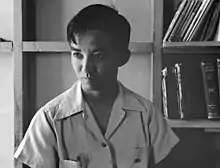Harvey Itano
Harvey Akio Itano (November 3, 1920 – May 8, 2010) was an American biochemist best known for his work on the molecular basis of sickle cell anemia and other diseases. In collaboration with Linus Pauling, Itano used electrophoresis to demonstrate the difference between normal hemoglobin and sickle cell hemoglobin; their 1949 paper "Sickle Cell Anemia, a Molecular Disease" (coauthored also with S. J. Singer and Ibert C. Wells)[1] was a landmark in both molecular medicine and protein electrophoresis, though the use of electrophoresis to separate hemoglobin variants had been pioneered by Maud Menten and collaborators some years earlier.[2]
Harvey Akio Itano | |
|---|---|
 Itano in 1942 | |
| Born | November 3, 1920 Sacramento, California |
| Died | May 8, 2010 (aged 89) La Jolla, California |
| Alma mater | University of California, Berkeley, St. Louis University, California Institute of Technology |
| Known for | Differentiating normal and sickle cell hemoglobins |
| Awards | Eli Lilly Award in Biological Chemistry (1954) Martin Luther King Jr. Medical Achievement Award |
| Scientific career | |
| Fields | Biochemistry |
| Institutions | |
| Thesis | I. Contributions to the Study of Sickle Cell Hemoglobin II. A Rapid Diagnostic Test for Sickle Cell Anemia (1950) |
| Doctoral advisor | Linus Pauling |
In 1979, Itano became the first Japanese American elected to the United States National Academy of Sciences (in the Genetics section). Itano was an emeritus professor of pathology at the University of California, San Diego.[3] Itano died in La Jolla, California of complications from Parkinson's disease.[4]
Early life

Itano was born in Sacramento, California. Itano attended the University of California, Berkeley where he was valedictorian of the Class of 1942.[5] However, due to Executive Order 9066, Itano missed commencement in Berkeley after he and his family were sent to the Tanforan Assembly center, prior to being sent to the Tule Lake internment camp.[6] Itano was later allowed to leave camp to attend the St. Louis University medical school, earning his M.D. in 1945. He then went to graduate school at the California Institute of Technology, where he received doctorates in chemistry and physics in 1950.[7]
Research
While at Caltech, Itano joined the lab of Linus Pauling and began working on sickle cell anemia, a genetic disease that Pauling was interested in.[3] Pauling was convinced that sickle cell disease was caused by defective hemoglobin, and set Itano to find out what made sickle cell hemoglobin chemically different.[8] After failing with a number of other techniques, Itano succeeded in differentiating normal and sickle cell hemoglobins using moving boundary electrophoresis.[9] He used an apparatus designed by Stanley M. Swingle, a variation on the original apparatus of electrophoresis pioneer Arne Tiselius.[10] He found that, under certain conditions, sickle cell hemoglobin is positively charged while normal hemoglobin is not, creating a difference in electrophoretic mobility.[8] By 1956, Vernon Ingram had determined that this was caused by a single difference in peptide sequence,[11] which by 1958 he determined to be a valine in the sickle cell mutant hemoglobin in place of glutamic acid in normal hemoglobin A.[12]
Itano's subsequent work brought the new field of "molecular medicine" to other genetic and blood diseases. In 1954, he won the Eli Lilly Award in Biological Chemistry, and in 1972 he won the Martin Luther King Jr. Medical Achievement Award, recognizing his sickle cell work.[9]
References
- Pauling, Linus; Harvey A. Itano; S. J. Singer; Ibert C. Wells (1949-11-01). "Sickle Cell Anemia, a Molecular Disease". Science. 110 (2865): 543–548. Bibcode:1949Sci...110..543P. doi:10.1126/science.110.2865.543. PMID 15395398. S2CID 31674765.
- Andersch, M. A.; Wilson, D. A.; Menten, M. L. (1944). "Sedimentation constants and electrophoretic mobilities of adult and fetal carbonylhemoglobin". J. Biol. Chem. 153: 301–305. doi:10.1016/S0021-9258(18)51237-0.
- K. W. Lee. "Remarkable Parents Who Raised Remarkable Family." Sacramento Union, June 25, 1979. Reprint from the Nichi Bei Times accessed August 25, 2008.
- "In Memoriam: UC San Diego Pathology Professor Harvey Itano, MD, PhD, 1920-2010". Archived from the original on 2011-06-29. Retrieved 2010-06-08.
- Doolittle, Russell F. (2014). "Biographical Memoirs: Harvey Itano 1920-2010" (PDF).
- Weglyn, Michi Nishiura (1976). Years of Infamy: The Untold Story of America's Concentration Camps. New York: William Morrow & Company. p. 108. ISBN 978-0688079963.
- Maugh II, Thomas H. (June 12, 2010). "Harvey Itano dies at 89; researcher whose studies provided a breakthrough on sickle cell disease". The Los Angeles Times.
- Ted Goertzel and Ben Goertzel. Linus Pauling: A Life in Science and Politics. New York:BasicBooks, 1995. p. 90
- "The Register of Harvey Itano Papers 1946 - 2000 Archived 2012-06-14 at the Wayback Machine", MSS 0226, Mandeville Special Collections Library, Geisel Library, University of California, San Diego. Accessed August 25, 2008.
- Swingle, Stanley M. (February 1947). "An Electrophoresis Apparatus Using Parabolic Mirrors". Review of Scientific Instruments. 18 (2): 128–132. Bibcode:1947RScI...18..128S. doi:10.1063/1.1740898. PMID 20288558. Archived from the original on 2012-07-11. Retrieved 2008-08-25.
- Ingram, V. M. (1956-10-13). "A Specific Chemical Difference Between the Globins of Normal Human and Sickle-Cell Anaemia Haemoglobin". Nature. 178 (4537): 792–794. Bibcode:1956Natur.178..792I. doi:10.1038/178792a0. PMID 13369537. S2CID 4167855.
- Ingram, V M (June 1958). "Abnormal human haemoglobins. I. The comparison of normal human and sickle-cell haemoglobins by fingerprinting". Biochimica et Biophysica Acta. 28 (3): 539–45. doi:10.1016/0006-3002(58)90516-X. PMID 13560404.
External links
- The Register of Harvey Itano Papers 1946 - 2000 - UC San Diego
- Key Participants: Harvey Itano - It's in the Blood! A Documentary History of Linus Pauling, Hemoglobin, and Sickle Cell Anemia